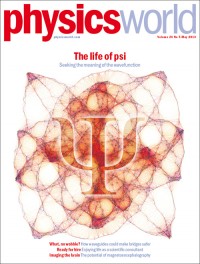Published in Physics World, 2 May 2013
The heart of quantum theory – some would say the heart of physics itself – is the wavefunction. But is it really some sort of wave? A new theorem has put the doubters in their place, as Jon Cartwright reports
 On publishing his wave equation in 1926, Erwin Schrödinger was showered with praise. “Your work springs from true genius!” wrote Albert Einstein. A month later, Schrödinger’s fellow Austrian physicist Paul Ehrenfest was still in awe. “Every day for the past two weeks our little group has been standing for hours at a time in front of the blackboard in order to train itself in all the splendid ramifications,” he admitted.
On publishing his wave equation in 1926, Erwin Schrödinger was showered with praise. “Your work springs from true genius!” wrote Albert Einstein. A month later, Schrödinger’s fellow Austrian physicist Paul Ehrenfest was still in awe. “Every day for the past two weeks our little group has been standing for hours at a time in front of the blackboard in order to train itself in all the splendid ramifications,” he admitted.
More than 80 years later, physicists are still try ing to grasp those ramifications. The Schrödinger equation is one of the most famous equations in history, describing how the quantum state of any system changes with time. It underpins quantum mechanics, a theory that has provided us with computers, lasers, solar cells and nuclear reactors. Yet the heart of the Schrödinger equation – its solution – is a mysterious term, known as the wavefunction. Most physicists will have heard of the term, but what does it really mean? And does it correspond to some sort of real wave?
These questions may seem trivial, but they are not. For anything, in principle, has a wavefunction – electrons, atoms, people, planets, even the entire universe. To picture all of these as waves – actual, physical waves – is challenging at best. It is for this reason that many physicists have suspected that the wavefunction only reflects our limited understanding of nature. Perhaps in the future we will uncover a deeper underlying reality – one that explains all the mystery of the quantum world, and one that leaves the wavefunction redundant.
Now it seems this hope could be misplaced. According to a theorem devised by a UK group of physicists, the wavefunction is no approximation – it really does correspond to something physical. The result has sent ripples through the quantum-physics community, much of which has been left wondering if we will ever have an intuitive grasp of reality. […]
The rest of this article is available here.